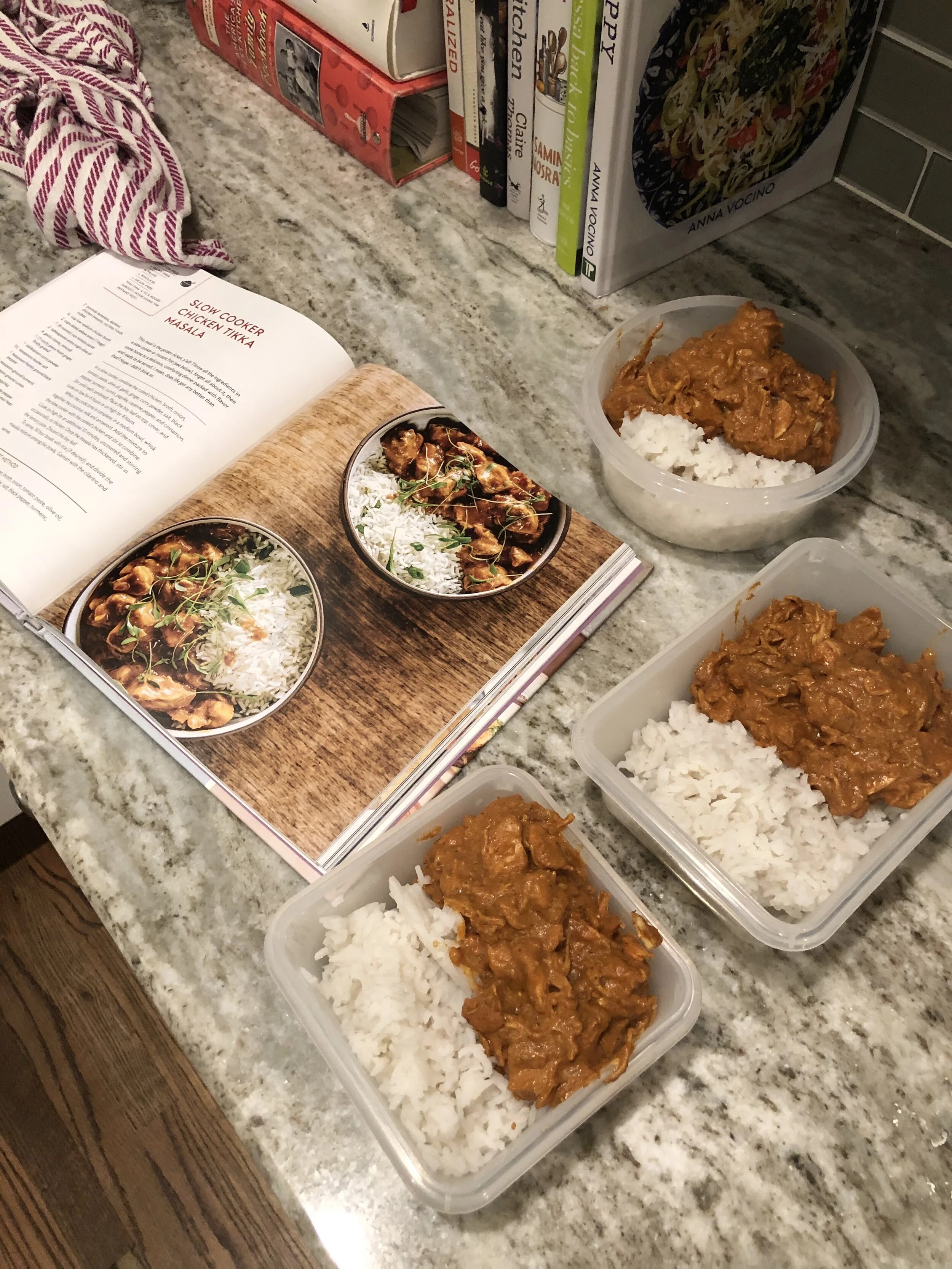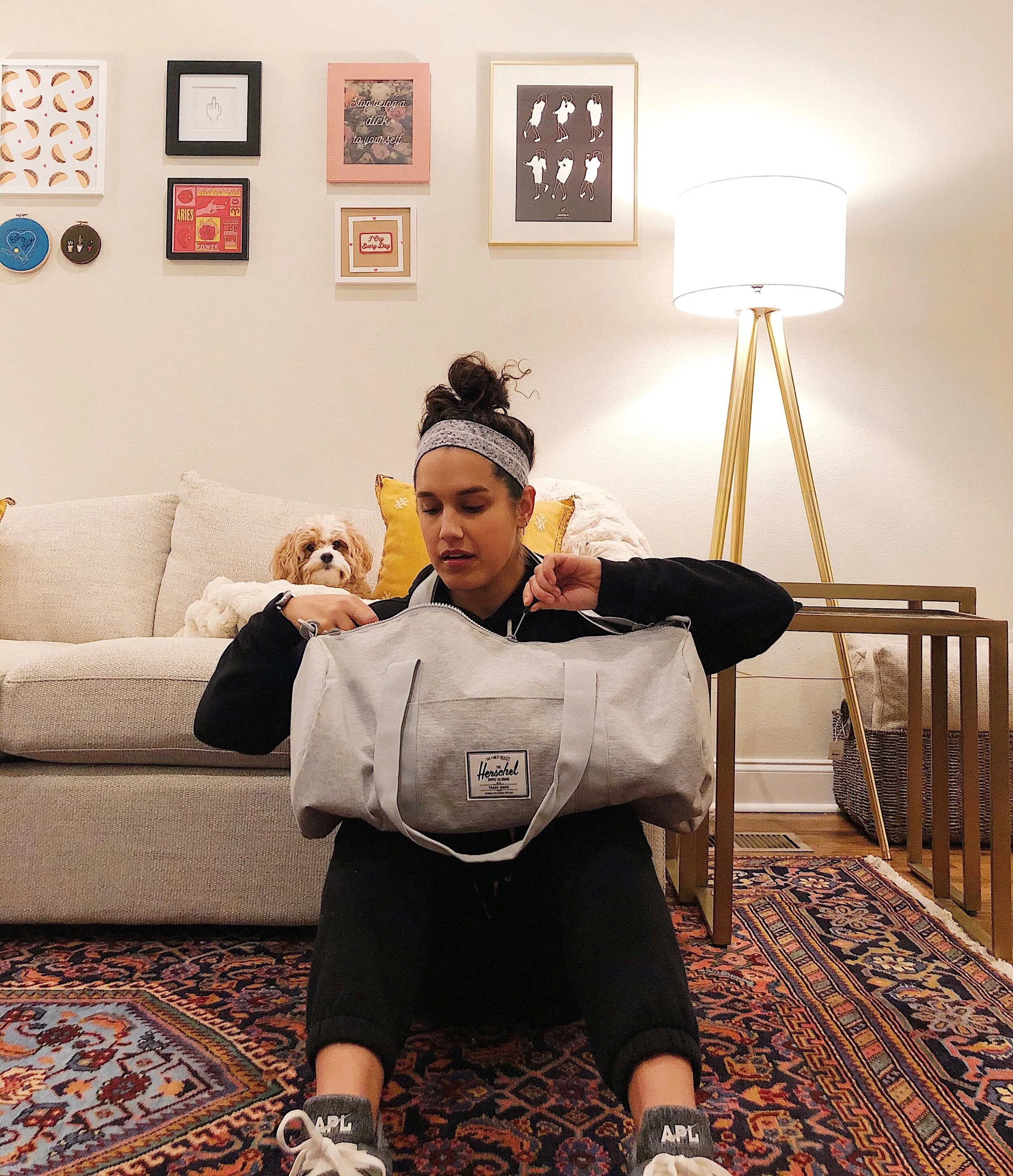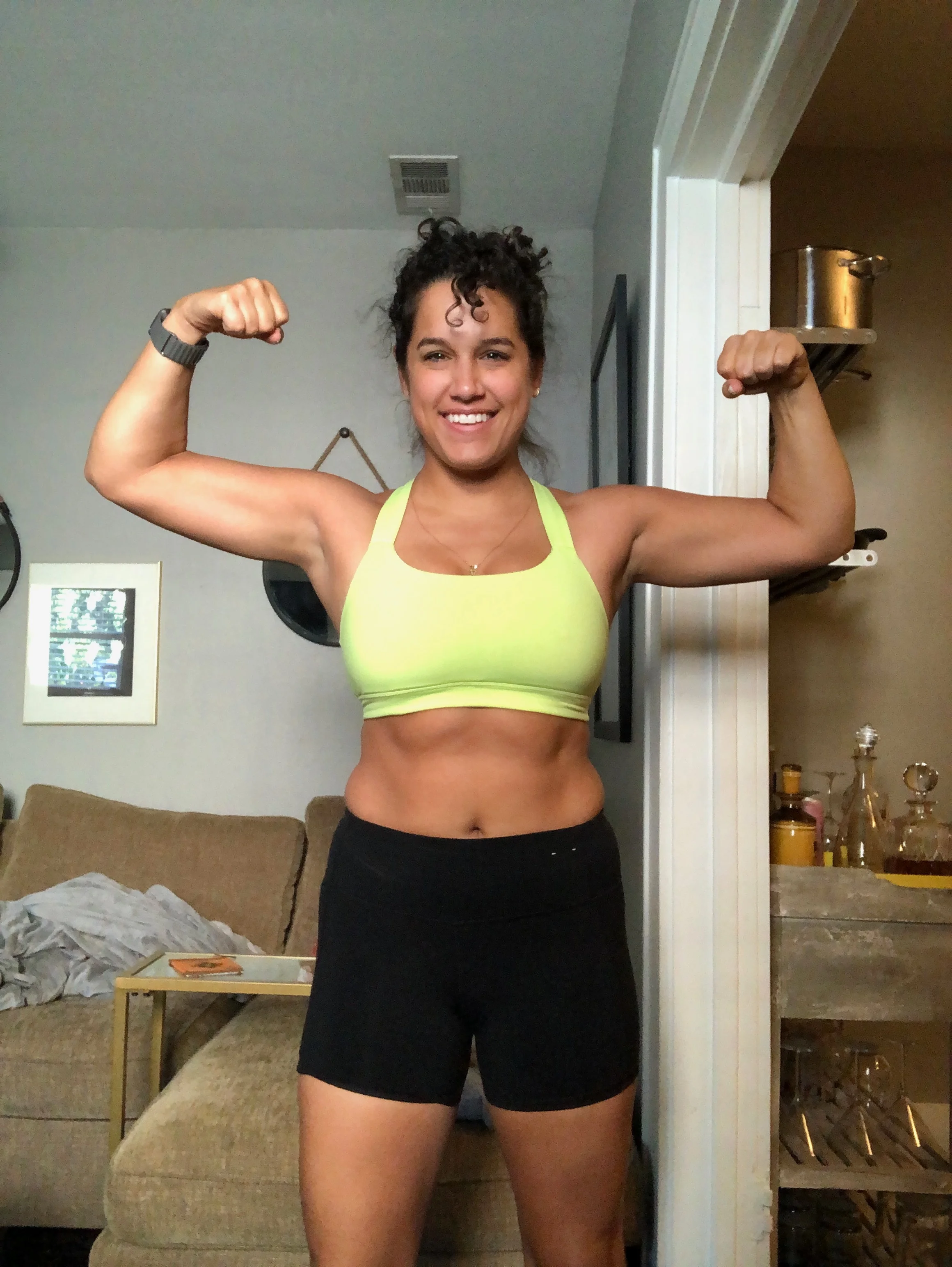Why Is Protein So Important and How Much Do We Really Need? Honest Answers From A Personal Trainer
Protein and getting enough of it is a bitch. On that, I think we can all agree. If you’ve ever paid attention to or been interested in nutritional information, dabbled in exercise, or have read even one article about a balanced diet and lifestyle, chances are you’ve picked up somewhere along the way that it’s all about PROTEIN PROTEIN PROTEIN. But why?
I’ve been training with my personal trainer, Meg, for over a year now. Meg gives you two options when you sign up for the whole shebang with her (custom workout plans, nutritional guidelines, weekly check-ins, constant encouragement, etc): you can track your food via calories or via macros (i.e. carbs, fats, and protein). Macros intimidate the hell out of me—they seem way more time consuming and way more confusing to track, so I went the calorie route. Doing so over the past year has definitely helped me to track my general food intake and consumption, but did nothing for my macros. I truly didn’t pay attention to them; all I knew was that the carbs and fat intake were super high whereas protein was my weakest area.
Now, I’m a pretty impulsive person. That is, I don’t need to think on something for days and weeks to act on it, which is sometimes really beneficial and other times really detrimental. Anyhow, the other week when I was in Foxtrot, I saw the blue bottle of Vital Proteins Collagen Peptides. I know it’s been popular for a while and had seen people I follow talk about putting it in their morning coffee, but I hadn’t ever looked into it. This day, though, I decided to pick it up and read the label. When I saw “18g of protein per serving”, I threw it in my basket (along with two bottles of wine, a candle, and numerous other goodies because Foxtrot is the best).
For whatever reason, that moment on that day was when I decided to shift my focus from calories to protein. I had never attempted to actually try and hit the protein goal Meg has had assigned to me for 13 months, but suddenly I wanted to. Last week, I consumed between 90-95g of protein each day and I felt the difference almost instantly. “What difference?” you ask? Well, I felt stronger. I felt lighter on my feet and within my body. I felt full. I didn’t have one moment of “OMG I’M STARVING” throughout the day because I was so satiated. I just felt balanced, if that makes sense. Having almost 30g of protein at breakfast, lunch, and dinner made a world of difference in my hunger and craving levels throughout the day. And, by the weekend, my boyfriend commented “Damn, you look more hourglass than usual!” (Granted, he hadn’t seen me naked in almost two weeks because he was sick, but that’s neither here nor there). This morning, when I did my check in with Meg, I saw it wasn’t in my head—my waist was a quarter of an inch smaller!
Now that I’ve seen and experienced what getting the right amount of protein for your body can do, I’m a believer. And, after posting my protein intake journey last week via IG, I saw how many of you were EXTREMELY invested in the journey. I’ve never gotten so many questions before, and I’m so glad that you guys are interested. Meg is the true expert here, so for this protein blog post, I let her handle the important questions while I answered y’all’s more personal, niche questions. I truly hope all this info provides you with some clarity or insight into why protein is so imperative and good for you, and if you’re interested in working with Meg 1:1, fill out her form. I obviously can’t recommend her enough because I keep doing it.
PART 1: EMMA’S Q&A
Q: How do you track your protein?
A: I do it via My Fitness Pal. If you sign up for their version of premium, you can base your goals and intake off of macros instead of calories.
Q: Why the sudden increase?
A: So I sort of already answered this in my monologue up there, but this isn’t an increase. The goal has always been there, I’ve just never actually tried because I’m a piece of shit.
Q: What does Vital Proteins taste like?
A: Nothing! It has no flavor and literally just dissolves in your coffee, tea, smoothie, whatever. That’s why it’s such an easy way to get a big boost of protein first thing in the morning. It’s effortless and tasteless.
Q: Protein poops/stomach issues?
A: I got a lot of questions asking if ingesting more protein is giving me stomach issues. I guess this maybe is a thing?! I had never heard of this as a side effect of eating lots of protein. Full disclosure: Ya girl is very regular. But after a week of putting the collagen peptides in my coffee every morning, I’m somehow more regular. I’m talking, halfway through my mug of coffee, it’s time. I think all this added protein has only helped my gut and digestion, and I don’t know if that’s weird but it’s the truth.
Q: High protein staples I love?
A: Nothing I say here is going to be groundbreaking, but I’ll list them out anyway! The collagen peptides powder, obviously. But also:
Eggs
Chobani’s Less Sugar greek yogurt and Siggi’s yogurt
Jerky (in all flavors and sizes and shapes)
Deli meat and canned tuna, salmon, etc.
Chia seeds (in Overnight Oats, Oatmeal, Smoothies, etc)
PB2 (Powdered Peanut Butter that’s a fraction of the calories of the real stuff. Perfect for smoothies or as a baking substitute)
MEAT (red, white, fish, whatever. I could never be vegetarian)
Q: Don’t you get full?
A: Um. Yes? That’s…the…point?! I got this question a few times and it confused me. Yes, of course I get full—that’s what I’m going for! To get fuller faster and feel 10x more satiated by eating more protein rather than feeling full from eating 20 Wheat Thins, two handfuls of popcorn, and pickles on pickles (some of my favorite snacks right there). By eating almost 30g of protein with every breakfast, lunch, and dinner last week, my snacking game was wildly different. Before this protein focus, I felt panicked constantly. Like I wanted to be eating every second. Not last week, though, and it was wild.
Q: Vegan or dairy free protein powder?
A: I don’t do protein powders anymore. I was hesitant to even get the collagen peptides, and can’t explain how relieved I am that they haven’t upset my system. Years ago, I realized I can’t handle whey-based powder, so I made the switch to pea protein and that worked for a while. I haven’t used it in a long time, BUT I would highly recommend this one! It was the only one I never had issues with.
PART 2: MEG’S Q&A
Q: How do you know or find out how much protein you need?
A: The answer no one wants to hear: It depends. But please for the love of God, do not use an online calculator.
If your goal is to gain muscle mass, I typically recommend one gram per pound of bodyweight OR ideal/goal bodyweight. However, this isn’t to say that if you’re 150 pounds that you should start eating 150g protein immediately. You have to consider your adherence. Consistency is the key to sustainability and there’s really no quick fix, even when it comes to increasing your protein. Slow and steady wins the race.
If you’re only currently consuming, say, 50g protein a day, you’re not going to be able to magically start consuming 100g more per day unless you sit in front of your fridge and eat a slab of chicken breast washed down with a carton of liquid egg whites. Increase incrementally so your body AND mind has a chance to adapt and you can gain momentum from there.
You may experience some digestive issues and the most ‘noxious farts you’ve ever almost croaked from if you increase protein too quickly as well. Your digestive system, like the rest of your body’s systems, takes time to adapt.
It can definitely be helpful to have a coach guide you as well as provide you with an outsider’s perspective and knowledge when approaching intake. This includes protein as well as your total caloric intake and balance of carbs & fats in order to reach your goals!
Q: Why? Why protein? What does it do and why is it so important?
A: Protein is an imperative macro for so many reasons, but I wouldn’t say carbs and fats don’t have just as many benefits!
However, when it comes to body composition, protein is crucial for building and maintaining muscle mass, preventing muscle atrophy (when muscle wastes away due to lack of activity, inadequate fuel, etc.), and it’s also the most thermogenic macro. This means, when your body digests protein it uses more digestive energy (caloric expenditure) than carbs and fats. When you eat protein, you feel more satiated because it suppresses the hunger hormone ghrelin (not gherkin. That’s a pickle but also yummy). Emma was spot on when she mentioned she’d been feeling fuller with her uptick in protein. It also holds a high-ranking career in carrying oxygen throughout your bloodstream and providing you with energy, and helps to heal your body and strengthen your bones, too. Golly, there are many more things protein is responsible for, but you and I would both be here for days! So consider this your TLDR version.
Oh, one more thing. There are SO many factors outside of protein that can budge the scale but like I addressed above, protein can cause digestive issues if increased too quickly or if you have an aversion to a specific food, of course. Tread lightly with the evil scale when measuring tangible progress.
Q: Can I still build muscle with a plant-based diet and how do I get protein?
A: First and foremost, building muscle comes down to patiently and consistently following a training and nutrition regimen specific to your body and goals. That being said, you can absolutely build muscle while eating a plant-based diet. I'm personally not plant-based, but I have no negative thoughts around that lifestyle at all—you do you.
If you're following a macro-based plan, as long as you're choosing foods that fit within those macro amounts as well as/or your calorie range and fueling yourself enough to build muscle, you shouldn't have any issues. In my experience with clients, oftentimes the biggest hiccup is where to find protein sources, but it's not as intimidating as you may think. There are tons of plant-based protein powders, plus food items like tofu, seitan, nutritional yeast (tastes like CHEESE!), hempseed, legumes (like edamame and peas), and even some grains like quinoa that are all awesome protein sources. If you're open to vegetarianism and not strictly plant-based, you can enjoy egg whites and dairy, too!
If you aren't following any sort of macro-based plan, just try to be aware of your protein consumption and have a good idea of your overall caloric intake vs. your expenditure so that you're eating enough to pack on that muscle. Side note: If you’re plant-based, you may need some extra vitamins and minerals that are most commonly found within animal products, so consider discussing this with a health professional if you feel like you're low in a certain nutrient or just generally not feeling "right" on a plant-based diet; you could be deficient in something. TLDR: Plant-based powerhouses can build muscle just as well as us meat-eaters! Ultimately, as with any type of lifestyle, experiment, have some fun with your food, and find what works best for your body.
Q: Is there such a thing as too much protein?
A: First and foremost, please stay far, far away from Jillian Michaels and the fear mongering she facilitates. Trust me when I say that unless you’re doing the aforementioned and chugging liquid egg whites and double-fisting chicken breast on a daily basis, you’re probably not over-consuming protein. In fact, way more people under-consume protein. If you want to be more aware of your intake, track for a week on an app like My Fitness Pal, see where you stand, then go from there! I would try to space your protein out relatively evenly throughout the day so you’re getting a good stream of it consistently and not an overwhelming amount at one meal. THAT might do a number on your digestion. Although temporary and not particularly harmful, you may experience constipation and gas, but just stay hydrated and it’ll pass. Pun intended.
Q: Are there “good” and “bad” proteins?
A: There are no good and bad foods in general, period. Are egg whites a more macro and calorie-friendly source of protein than a ribeye steak? Of course. But there’s room for both, always.
Some foods nourish our body a little more than they nourish our soul. Focus on those, make it fun and adventurous, and always make room to sprinkle in some soul food when appropriate.
Once again, if you’re interested in training with Meg herself, fill out her form on her website. And if this post only left you with more protein questions, email me and I’ll see if I can coax Meg into lending her brain to us further!
Thanks for reading, y’all. NOW GO EAT SOME ‘TEIN.
xx,












